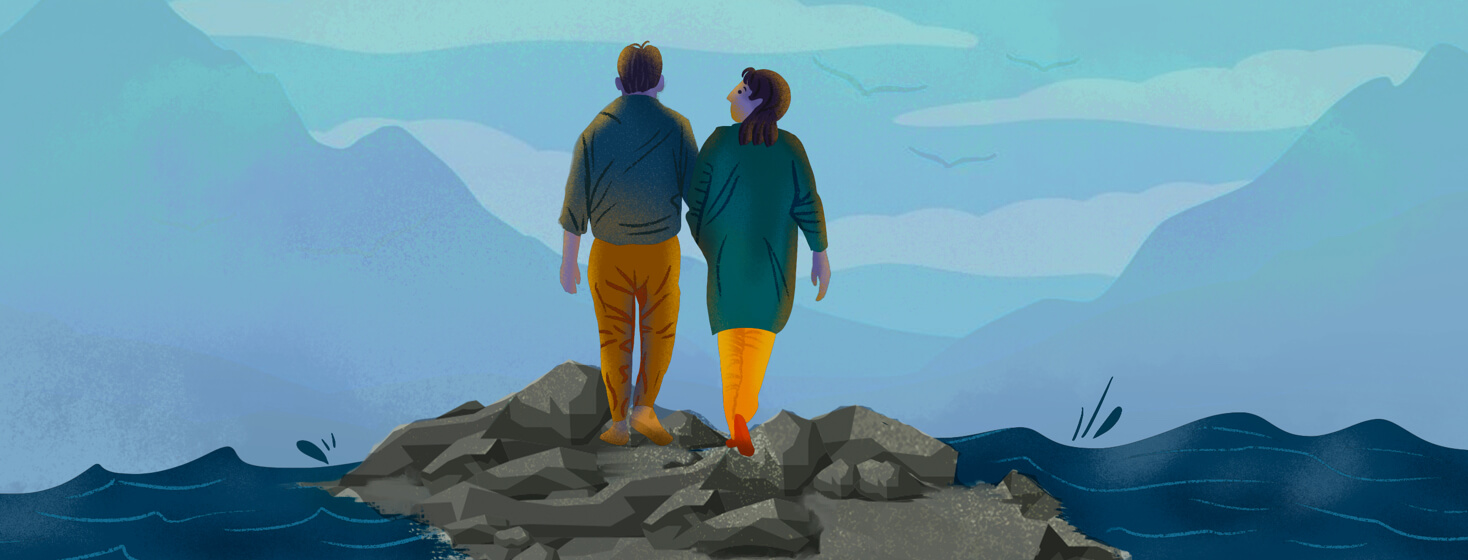Why Not Now? Taking Opportunities When You Live with MS
I recently went on a camping trip to the coast—Cape Disappointment in southwest Washington state. Among its many beautiful features stands North Jetty, a 2.5-mile-long “rubble mound” along the north side of the Columbia River where it meets the Pacific.
As a kid, I climbed that jetty with my brothers. We poked through tidepools along its base during low tide. Sometimes we fished while standing along boulders stacked 30 feet high. The Army Corps of Engineers recently rebuilt the broken-down, century-old jetty. I couldn’t wait to climb the new one.
The decision to keep going
We found easy access to it following a sandy tideland trail. We found the new jetty offered a wide, flat, graveled centerline running its length. This made it much easier to walk. It replaced the older mound with its rickety wooden boardwalk which had washed away thanks to rising sea levels and monster surf.
We walked until the gravel stripe grew thinner and rockier. Finally, it disappeared into a solid spine of boulders. Most were thankfully flat and bone dry, making it possible, with some dexterity, to continue our jetty walk.
After a few minutes, my husband stopped. “Keep going?” Without hesitation: “All the way to the end. You never know if it’s your last chance to do something.” I’m certain he just wanted to clarify I was up for it.
I’ve faced previous situations where rock hopping wasn’t advised: dizziness, heavy legs, weak muscles, and questionable balance are good reasons to stick to safer terra firma. But I felt energetic, with few symptoms. Why give up halfway?
Moving forward on a rocky journey
Sure, I needed to pick the right stones and prepare to catch myself should one shake loose beneath me. Which happened. Along a path of smaller rocks, one gave way. I gracelessly dropped, nicking my knee and bruising my palm as I steadied myself.
But the view on that gorgeous July day! Fleets of pelicans soared overhead. Porpoises chased the drafts of trawlers heading out to sea. The boulders themselves were stunning, some milky green in color, others studded with metals—possibly pyrite.
At the jetty’s end, several eight-foot-high verticals created a wall. Another hundred yards beyond, the jetty narrowed, dropping to a point before receding into the ocean. Along this last part of the jetty’s spine, more large vertical rocks stood, aligned like stegosaurus plates.
I refused to let "can't" be an option
But now large gaps between boulders suggested how one might disappear should they lose their footing. My husband had disappeared behind the wall. When I finally passed it, I could no longer see him. I called out but heard no reply in the high wind and roar of crashing waves.
I grew concerned. I wasn’t worried that I might fall along this jagged stretch. I wondered if he’d fallen in. If so, I doubted I’d find him. Then it occurred to me: I wasn’t exactly using common sense either.
About halfway down the spine, I finally glimpsed my husband between the verticals. I stopped, relieved. My husband held up his phone. “Picture?” He pointed to a large flat rock behind me—a tricky destination to risk, with empty spans and tilted stone faces to navigate. My feet and legs were fatigued and stiff by now.
I paused. “If you can’t…” He said "can’t" with the same impatience that loved ones say things when they forget you have MS because your symptoms are mostly invisible. As a kid, I played sports, camped, and enjoyed a tomboy’s life. Can’t wasn’t part of my vocabulary then. Now, at age 55, it plays a role…
If there isn’t a picture, it didn’t happen
It took shifting my center of gravity, with slower, longer extensions of my feet and legs, to safely claim the flat rock. After the picture, though, I faced renewed anxiety.
I needed to climb both up and back. Adrenaline kicked in. I scouted a safer return passage. It required both hands and feet. I broke a sweat in the stiff wind. Once returned to the wall with my husband, I gazed down the rocky length back to camp: about two miles to the truck.
I took a deep breath, checked in. Hamstrings trembled, arches cramped, my lower back barked at me. I felt my confidence in the strength and reliability of my body fade. My husband walked far ahead. Meanwhile, I picked my way slowly.
I stopped to admire anglers pulling in fish while perched on boulders close to the surf. I listened to cormorants squawking overhead. I paused to trace the glistening glacial veins of boulders along the path. I’m so thankful I claimed this renewed opportunity — it was worth every painful joint, every shaking muscle, every second thought.

Join the conversation